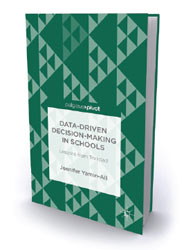
  If students are the future of a nation, are intuition and speculation sufficient to determine their future? Are schools prepared for responsible decision-making through the use of data? Why should schools strive to become data-driven in their decision-making? If students are the future of a nation, are intuition and speculation sufficient to determine their future? Are schools prepared for responsible decision-making through the use of data? Why should schools strive to become data-driven in their decision-making?
The use of data to make decisions is not new either to the business or the education sector. However, both micro and macro policy-making in education have not shown evidence of the thorough and widespread use of such decision-making, either nationally, regionally or internationally.
Dr Jennifer Yamin-Ali, lecturer and programme coordinator at the School of Education of The UWI, has written a book on this subject, “Data-Driven Decision-Making in Schools: Lessons from Trinidad,” published in January 2014 by Palgrave MacMillan. This book presents research findings from a project Dr Yamin-Ali undertook in five secondary schools in Trinidad.
It captures the status of data-driven decision-making in some schools in Trinidad, and presents case studies of five secondary schools which are considered to be prestigious. Each chapter reports on a separate case representing a concern articulated by each school. The five concerns are:
- the challenge of maintaining school culture in a traditional school setting
- student stress at the sixth form level
- male adolescents’ conceptions of success and perceptions of their school experiences
- subject selection at the secondary school level
- re-masculinising the boys’ school
This book, ideal for teachers and school administrators, describes the process used to initiate the journey from articulation of the concern to collection of the data. Schools challenged by insufficient knowledge or skills in research will benefit from seeing how the collegial relationship between university faculty and school can be a constructive one. The role of the guide or facilitator, and the role of the teacher-as-researcher are evident in the elaboration of each study.
All five case studies include detailed findings under each of the five concerns outlined above. The chapters are useful not only for the research process, but for the perennial and recurring issues explored, common to schools worldwide over time. The literature reviews presented in each case also immerse the reader in a deeper understanding of the issue within the framework of education internationally.
The book opens with an account of the experiences, knowledge, skills and views of teachers and administrators in the five schools in the context of the case studies. It describes the research capability and potential for data driven decision-making in these schools, using participants’ voices and statistics. Many practitioners in the field will be able to relate to the findings presented in this account.
“Data-Driven Decision-Making in Schools: Lessons from Trinidad” is available in e-copy from providers including Amazon Kindle, Google eBooks, Ebooks.com, Nook, Kobo, Ingram Digital, DawsonEra, Ebrary, EBSCO and My iLibrary. Hard-cover copies are available from amazon.com and from www.palgrave.com. |





